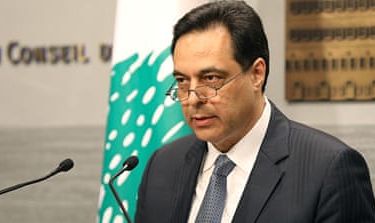Lebanon to ban flights from 11 coronavirus-hit countries
The ban announced by Prime Minister Hassan Diab includes all travel by land, sea and air.

Beirut – Lebanon will ban all travel to and from 11 countries that have witnessed significant outbreaks of the coronavirus, including an immediate ban on Italy, Iran, China and South Korea.
Authorities will give a four-day grace period to Lebanese citizens, and their families who are seeking to return to Lebanon from France, Germany, Spain, the United Kingdom, Iraq, Egypt and Syria before also banning all travel to and from those countries, Prime Minister Hassan Diab announced on Wednesday.
Keep reading
list of 3 itemsMost Lebanese MPs oppose paying debt even if it means default
Distrust in Lebanese banks spurs bitcoin boom
The ban includes travel by land, sea and air.
Diab’s announcement at a news conference came as Lebanon registered its second death from the coronavirus on Sunday, – a man in his 50s who reportedly had pre-existing conditions – while the total number of infections rose to 61.
Conversely, Lebanon’s first registered coronavirus patient, a woman who returned from Iran in late February, was announced to be entirely free of the virus.
The global pandemic has seen more than 122,000 people infected, with deaths nearing 4,500. Many countries in the Middle East have taken similar steps of banning travel, including Saudi Arabia, which has banned flights to and from Lebanon.
While Diab stopped short of announcing a state of emergency, he asked local authorities to prevent all large gatherings of people.
|
|
Bars, nightclubs and exhibition centres were already ordered to close over the weekend until March 15, while schools and universities have been shuttered since the beginning of March.
Diab also called on businesses and public institutions to work with the minimum required number of employees needed to maintain productivity.
‘Infected death planes’
Many have called out the government for not acting sooner to stop flights from Iran, the regional epicentre of the outbreak, and Italy, which has seen the world’s worst outbreak outside of China.
“How long will Beirut Airport continue to receive infected death planes from the east and west,” Walid Joumblatt, a prominent politician and leader of the Druze Progressive Socialist Party, tweeted shortly before Diab’s news conference.
Asked by a reporter about the delay in halting travel from those nations, Diab said the government had taken the precautions necessary by individually screening arriving passengers.
He said the government’s response had been “strict” from the outset, and some sides criticising its response were looking to “score political points”.
Economic contagion
The outbreak in Lebanon has hit as the country as it struggles with its worst economic and financial crisis in a generation that has devalued the currency by more than 40 percent, spiked inflation, and seen thousands lose jobs or have their hours slashed.
Contractors at the Rafik Hariri University Hospital in Beirut, the main hospital used to quarantine and treat coronavirus patients, announced an open-ended strike on Wednesday evening that they said was caused by the “indifference” of management to “harsh conditions under which hospital staff suffer”.
Hospital staff have complained about late payment of wages for years and have staged recurring protests and strikes.
Streets in the capital Beirut were uncharacteristically empty at rush-hour Wednesday as some supermarkets witnessed long lines of people stocking up on essentials goods such as bread, cooking oil and toilet paper.
Lebanon has already seen a host of precautionary measures implemented by various authorities: Friday prayers have been cancelled and priests have been ordered not to give communion.
Parliament has also postponed all meetings of its committees and was disinfected by health professionals on Tuesday, leading many online to make jokes about an institution that they see as a core of the country’s rampant corruption.
“The best way [of disinfecting parliament]: Early elections,” Lebanese Twitter user Jessica Obeid said, reiterating a demand of anti-establishment protesters in the country.